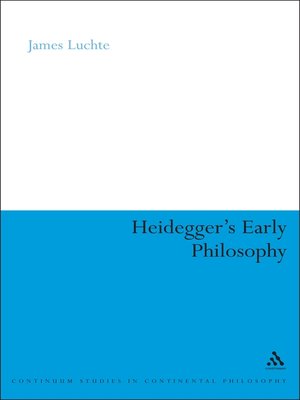Heidegger's Early Philosophy
ebook ∣ The Phenomenology of Ecstatic Temporality · Continuum Studies in Continental Philosophy
By James Luchte

Sign up to save your library
With an OverDrive account, you can save your favorite libraries for at-a-glance information about availability. Find out more about OverDrive accounts.
Find this title in Libby, the library reading app by OverDrive.



Search for a digital library with this title
Title found at these libraries:
| Library Name | Distance |
|---|---|
| Loading... |
In Heidegger's Early Philosophy, James Luchte sets forth a comprehensive examination of Heidegger's phenomenology between 1924 and 1929, during which time Heidegger was largely concerned with a radical temporalization of thought. The book seeks to re-construct Heidegger's radical phenomenology through an interpretation of all his published and unpublished works of the period, including the 1920s lecture courses and his published works, Kant and the Problem of Metaphysics and his magnum opus, Being and Time. The book also explores Heidegger's relationship with other philosophers, such as Husserl, Kant and Leibniz, with respect to the question of the relationship of thought and temporality.
The book addresses a significant void in the treatment of Heidegger's early phenomenology, emphasizing the importance of Heidegger's lecture courses and other works besides Being and Time, and thereby investigates the many fragments of Heidegger's work so as to more fully comprehend the meaning and significance of the original project. James Luchte makes an extraordinary and hugely important contribution to the field of Heidegger Studies.
The book addresses a significant void in the treatment of Heidegger's early phenomenology, emphasizing the importance of Heidegger's lecture courses and other works besides Being and Time, and thereby investigates the many fragments of Heidegger's work so as to more fully comprehend the meaning and significance of the original project. James Luchte makes an extraordinary and hugely important contribution to the field of Heidegger Studies.







